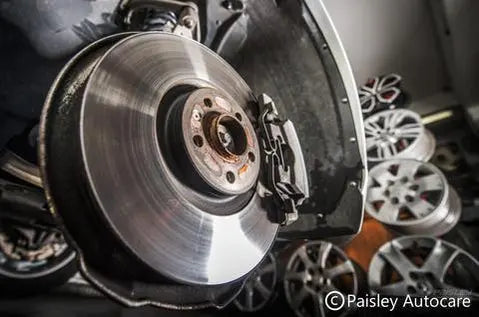While suddenly having no brakes is a pretty unlikely situation, the fact remains that your brakes do wear down over time and they will, sooner or later, require professional attention to put them right again. Avoiding a worst-case scenario and sidestepping very costly repair bills is, in fact, as easy as knowing the signs that your brakes are in need of a check.
First, you can always take a look at the brake pads yourself. If you can see the brake pad through your alloy wheel and can get a good sense of its thickness, then this can be your first line of protection against faulty brakes.
If you check the pad and gauge the thickness clearly, and you notice that there is only about 3-4mm of pad left, then it’s definitely time for a change. That’s typically the absolute minimum safe level. Even if it’s slightly thicker, you might consider a change if you notice any of the following signs below.
Second, you may notice unusual responsiveness. Faulty brakes or contaminated brake fluid can sometimes cause over sponginess or unusual hardness in the pedals when braking. If you notice that the responsiveness of the brakes has changed from its usual state, then that’s another classic warning sign.
While you may not have paid such close attention to the exact feel of your brakes, most drivers still get the feeling when something feels different, because it breaks with their established sub-conscious norm.
Third, there’s a vibrating or grinding noise. If you feel juddering vibration or hear deep grinding noises when you’re braking (especially when braking sharply), then it could be that your brake rotors are worn. This can turn into a very serious repair if left unattended, so think of the noise as a kind of alarm going off, warning you to seek assistance.
Next, you’re pulling to one side when braking. This one can be quite unsettling for drivers, but is at least a noticeable problem that can spur you to get help before things get worse. When your brake pads are worn unevenly, this can cause the car to veer slightly when you’re braking, since the two pads are working at different rates of efficacy.
It’s because of this problem that you should always replace your brake pads in pairs, and never individually.
Finally, your car may warn you of the need for a change in the brake pad. Your car’s dashboard should also have a brake pad warning light that will tell you when your brake pad is showing problems. It usually means that the pad is worn and in need of replacement. This is not a warning light to brush off as your car just being “over-sensitive.”
We all rightly fear our brakes failing us when we are out on the road, and especially when we are driving at speed. Take care of your brakes, and make sure you book you heed any and all of the warning signs we mentioned above. It might just save your life!




